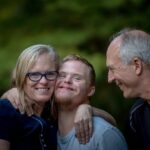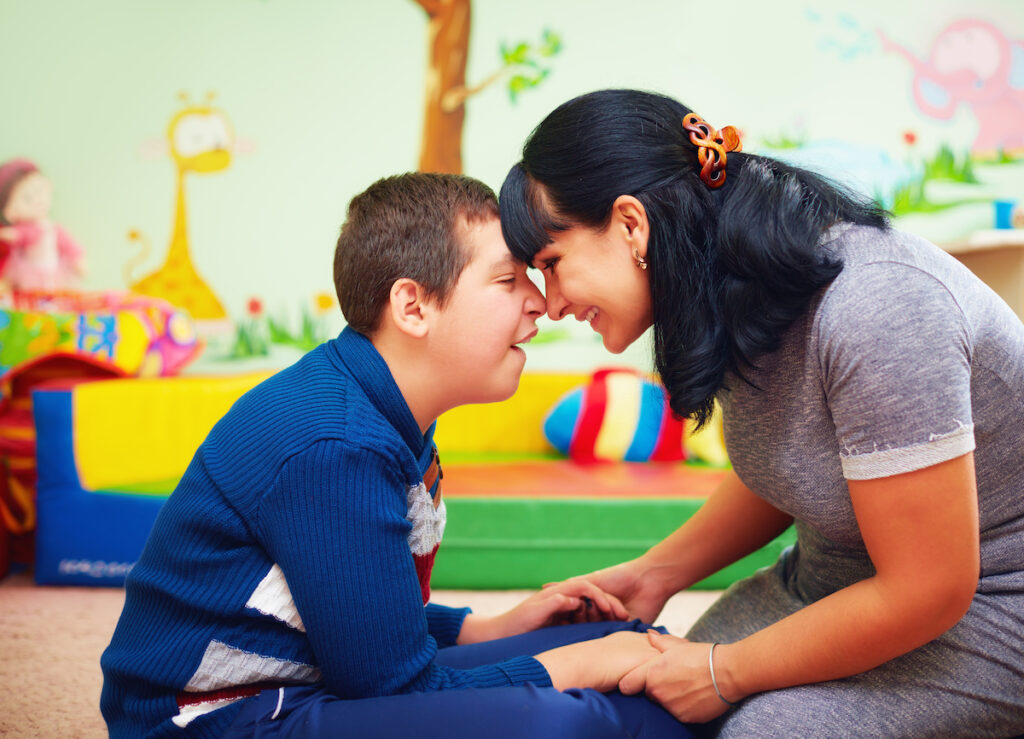
As a support worker, I have frequently witnessed the extra load raising a child with an intellectual disability can place on parents. Emerson et al. (2010) found that parents of children with intellectual disability are at a greater risk of developing psychological disorders. The reasons for this have shown to vary. Other work by the same group (Emerson et al., 2006) had previously indicated that characteristics in both child and parents, culture and socioeconomic factors all affect parental well-being.
Studies have highlighted the varying impacts different diagnoses can have on parents. For example, Griffith et al. (2010) suggested that mothers raising children diagnosed with autism reported greater concerns for their children and increased levels of stress than those with children of Down syndrome. The reasons for this variation are not necessarily clear and could involve a range of different factors.
Consequently, it’s crucial to get a better understanding of this area of research to improve the support for such parents and, ultimately, create a more beneficial environment for everyone involved. In this blog, I will discuss and evaluate the largest investigation to date on the well-being of caregivers in the context of childhood intellectual disability conducted by Baker et al. in the British Journal of Psychiatry (2021).

For various reasons, including cultural and socioeconomic factors, parents of children with intellectual disability have been shown to be at a greater risk of developing psychological disorders. In this study, Baker et al. investigate the well-being of caregivers in that context.
Methods
All participants were a parent or the primary carer of a child at least three years of age, who had a clinically documented developmental delay or intellectual disability and a molecular genetic diagnosis. In total, 888 children and their parents participated in the final analysis. The children’s ages ranged between 4 to 15 years, with a mean developmental quotient of 55.35 (s.d. 21.36). The number of children in the study were categorised as follows:
- Cope number variants (CNV) – 541
- Single nucleotide variants (SNV) – 148
- Multiple CNV – 119
- Other chromosomal – 46
- Sex chromosome aneuploidy – 34
Data were collected from the parent or carer of the child via online data entry (78%), online with telephone support (5.2%), telephone interview (14.9%) or face-to-face interview (1.8%), according to their choice. If participating parents or carers were raising the children with a partner, they completed a survey for them too. Irrespectively, all the interactions consisted of the following assessments that provided numerical scores.
Assessments of parents parental well-being:
- Everyday Feeling Questionnaire (EFQ) (for themselves and their partner)
Assessments of the intellectual disability’s social and psychological impact:
- Impact Supplement of the Strengths and Difficulties Questionnaire (SDQ)
Assessments of child characteristics:
- Development and Well-being Assessment (DAWBA)
Assessments of social circumstances:
- Residential postcode (used to obtain the Index of Multiple Deprivation)
- Recent Negative Life Events checklist
- A sum of the children and adults living together
The relationships between scores were tested via structural equation modelling. These results were also compared to those provided by the UK Office for National Statistics, consisting of 5,279 mothers and other caregivers of 8-19 year old children, constituting the average UK parent.
Results
Both respondents and their partners were found to have significantly higher levels of distress than the general population of UK parents. These levels of distress increased with their child’s intellectual disability’s perceived social and psychological impact. Additionally, variation in child characteristics and social circumstances accounted for 27.1% of the variance in these perceived impacts and 15.3% in caregiver well-being scores.
The scores for social and psychological impact were significantly higher for carers of children diagnosed with CNV. Subsequently, the researchers analysed the relations between CNV characteristics and caregiver distress in those families of children with CNV diagnoses only. CNV characteristics accounted for 24.7% of the variance in impact scores and 13.8% of the variance in caregiver well-being.
Rather than the severity of developmental delay, four aspects of a child’s intellectual disability–associated phenotypes accounted for predicted social and psychological impact. These included Autistic Spectrum Disorder, Conduct Disorder/Oppositional Defiance Disorder, additional psychopathology and physical disability.

The findings suggested that parents of children with intellectual disabilities presented with higher levels of distress, which were associated with the perceived social and psychological impact of the disability.
Conclusions
Ultimately, Baker et al. (2021) found that intellectual disability diagnoses can be predictors of parental well-being. Importantly, the study shed light on the distinct social and psychological parental impacts that different diagnoses bear, which are mediated by social circumstances. For example, the effects of CNV diagnoses were independent of phenotypic variation, suggesting that the impact of diagnosis may reflect between-group differences in their social implications and received support, not a direct genotype consequence.
SNVs often cause more severe physical and intellectual disability, necessitating more comprehensive education, medical and social support. Whereas CNV-associated intellectual disability is often characterised by moderate intellectual disability, but importantly, the authors note, often coupled with prominent behavioural problems. Therefore, children and parents may not receive the same support and parents are crucially more likely to face both greater so-called ‘violations of expectations’ and therefore reduced tolerance from the wider community, leading to greater problems of uncertainty and social isolation, negatively impacting their well-being.

The social and psychological impact of a child’s intellectual disability on parents and carers may be mediated by social factors, such as support plans in place.
Strengths and limitations
The study has various strengths, including:
- Being the largest investigation to date of the well-being of caregivers in relation to their child’s intellectual disability, and it is the first to include evaluation of genetic diagnosis as a predictor of risk;
- The SDQ impact scale integrates distress, the function of the child and perceived family burden, namely the role of external factors;
- The sample was found to be diverse, enabling valid wider associations between parental well-being and social characteristics to be made.
Of course, some limitations exist in relation to participant sampling and measurement tools, as highlighted below:
- Children with intellectual disability of unknown or acquired origin were not considered in this study;
- The number of eligible families who received information about the study, but did not participate, is not described;
- The lack of fathers involved as primary respondents may hinder interpretation;
- The researchers applied broad categorisations of genetic diagnoses, which grouped individual disorders that can have significant differences from each other;
- Factors previously established as important predictors of impact were not measured in this study, for example, physical health and household-level poverty;
- The study investigates sensitive material via self-report. Therefore, there are risks that ‘social desirability’ effects may weaken the study findings;
- The researchers asked respondents to provide estimated scores from their partners’ perspectives. However, proxy ratings limit the independence of measures and potentially their validity.

This study is the largest investigation of caregivers’ wellbeing in relation to their children’s intellectual disability, however, the lack of father’s involvement and self-reported data may affect the generalisability of the evidence.
Implications for practice
First and foremost, the findings underline the unmet need of many parents who provide so much care for their children, whilst also reminding us of their resilience. The study suggests that perceived impacts could be used as targets for tailored interventions to help reduce or prevent psychological disorders. Different diagnoses carry different causes for parental stress, which then may require alternative forms or degrees of support to maximise appropriateness and utility. For example, parents of children with CNV may be more distressed than other groups due to social consequences; thus, interventions could focus more on social support.
Accordingly, parents might receive an assessment of the impact alongside the health and social care of their children. To improve this application, future research should address the trajectories of parental experience (i.e. before, at and after diagnosis) to determine optimal timings of family risk assessment and interventions.
As a support worker, I have frequently worked with children with intellectual disability. This study raised my awareness of the importance that local support networks have for parents, thus this will enable me to check in with parents and potentially signpost to appropriate support. Tailored support and community links could help them emotionally and practically, which most likely benefit their child too.

Support plans following the diagnosis of a child’s intellectual disability should consider the unique impact that a diagnosis can have on parental well-being and include tailored interventions to benefit the family.
Statement of interests
None.
Links
Primary paper
Baker, K., Devine, R. T., Ng-Cordell, E., Raymond, F. L., & Hughes, C. (2021). Childhood intellectual disability and parents’ mental health: integrating social, psychological and genetic influences. The British Journal of Psychiatry, 1-8.
Other references
Emerson, E., Hatton, C., Llewellyn, G., Blacker, J., & Graham, H. (2006). Socio‐economic position, household composition, health status and indicators of the well‐being of mothers of children with and without intellectual disabilities. Journal of Intellectual Disability Research, 50(12), 862-873.
Emerson, E., McCulloch, A., Graham, H., Blacher, J., Llwellyn, G. M., & Hatton, C. (2010). Socioeconomic circumstances and risk of psychiatric disorders among parents of children with early cognitive delay. American journal on intellectual and developmental disabilities, 115(1), 30-42.
Griffith, G. M., Hastings, R. P., Nash, S., & Hill, C. (2010). Using matched groups to explore child behavior problems and maternal well-being in children with Down syndrome and autism. Journal of autism and developmental disorders, 40(5), 610-619.
Photo credits
- Photo by Nathan Anderson on Unsplash

Hello Charlie and Derek – Thanks so much for taking the time and care to review our paper. If you have ideas for how we could take this research forward, and how we could make it count for families, please do feel free to get in touch!